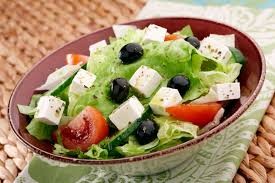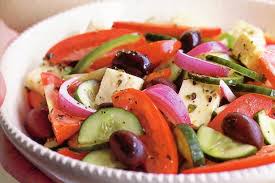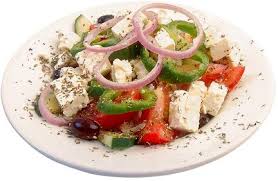Greek salad is a traditional dish of Greek cuisine and is perfectly compatible with the Mediterranean diet, as a matter of fact is part of it!! Greek salad is known in most countries of the world by its name and is a popular dish for tourists in Greece. During summer months the Greek salad can become the main meal for many people. It’s a full meal since it includes components of all food groups, while it is perfectly combined with wholegrain bread or rusk.
The ingredients of the Greek Salad include seasonal vegetables: tomato, cucumber, onion, pepper, olives and olive oil. The composition is completed by a piece of feta cheese and of course oregano which is added to the end on top. It is a tasty, nutritious and refreshing salad on hot summer days. But what is the secret that makes the Greek salad valuable plate of the Mediterranean diet?
Let’s examine the nutritional value of each of the components of the Greek Salad separately
Tomato: Tomato is particularly important because of its increased content of lycopene, which belongs to the family of carotenoids and has strong antioxidant activity. Lycopene belongs to the essential nutrients, because the human body cannot synthesize it by its own. Tomato is one of the main sources of lycopene, which is also responsible for the bright red color. Lycopene has been studied intensely in recent years with the results showing an antitumor effect which in essence fights cancer. The bioavailability of lycopene is greatest when tomatoes are cooked (due to heat) and when accompanied by a fatty substance (it is fat soluble). Tomatoes also contain various other elements and vitamins such as vitamin C and E, folic acid, selenium, potassium.
Cucumber: Cucumber is the second basic component of Greek salad. Cucumber is more than 90% water and that’s the reason that contains just a few calories. This low calorific value is that has made it popular in all diets and weight loss efforts. Cucumber is not only a refreshing vegetable of the Mediterranean diet, but it also contains some vitamins such as C, B1, B2, folic acid, while vitamin A is found in its husk. Its peel has a high fiber content that contribute to the smooth bowel function.
Pepper: pepper is a vegetable which we can be found at about 50 different species. In the Greek salad is usually used sweet pepper. Whatever the type, pepper is rich in vitamin A and vitamin C, which is known for its antioxidant effect and protection against colds. Indeed, vitamin C in peppers is comparable to the amount found in oranges. When pepper is consumed raw, it preserves its vitamin content.
Onion: onion might be causing us tears when we peel it and leave us with an unpleasant breath, but it’s an essential component of Greek salad, and Mediterranean diet in general. It has a strong aroma and distinctive flavour and was known from ancient times. Since then it was considered to have a therapeutic effect. Its important properties have been proved through studies that showed an increased content of flavonoids, which have antioxidant properties. It is considered that onion has anti-inflammatory and antibacterial properties, while its content to vitamin B6 can help reduce levels of homocysteine in the blood and thus prevent cardiovascular disease.
Olive: olives are a basic detail of the Greek salad. They are perhaps one of the most famous features of the Mediterranean diet. Rich in vitamins A and E, known for their antioxidant effect as it was mentioned earlier. There are many different varieties of olives, so there are differences depending on where you are. Do not forget they are a high-fat food and therefore overconsumption might promote weight gain
Feta cheese: feta is undoubtedly the most famous Greek cheese worldwide. Therefore it could not be missing from such a typical dish of the Mediterranean diet. It is the component that completes its flavour and of course is the main protein source of the dish. It is made from sheep’s or goat’s milk, white in colour and salty taste. As all dairy is rich in calcium, required for healthy bones and teeth, but is also high in fat and sodium, and consequently people suffering from hyperlipidaemia or hypertension must be very careful with its consumption.
Olive oil: Olive oil is the base oil used in the Mediterranean diet. It is very rich in monounsaturated fat, vitamin E, and polyphenols. It is known for the antioxidant effect by reducing levels of LDL, while maintaining unaffected the levels of HDL. Moreover olive oil has antitumor activity, protects against blood thrombus and cardiovascular disease and appears to reduce blood pressure. When olive oil is consumed raw it retains all the nutritional properties and for this reason is a basic ingredient of Greek salad, enhancing the flavour, but also its nutritional value. Its calorific value is high and therefore the amount used must be limited.
Oregano: sounds as a detail, but is rather the detail that makes the difference. The intense aroma is due to the presence of essential oils, which beyond the significant enhancement to the flavour of the dish, also provide a strong antibacterial and antioxidant effect. At the same time it contributes to the overall fiber intake of the dish.
Of course we must not omit to mention that Greek salad, is almost always combined with bread or rusk without these being a key component of the dish, but rather necessary accompaniment.
We conclude that Greek salad is a typical meal of the Mediterranean diet. It combines protein, fat and starch with high nutritional value. Caution is certainly needed as it was discussed above, in fat as it can dangerously increase the caloric content of this salad. Also attention is needed in the amount of starch that is used (bread or rusk) because along with the olive oil are a dangerous combination of high caloric value. The calorific value of Greek salad, as described, is approximately 400-500 calories.
So, do not be confused by the name “salad”. If you are going to consume the entire serving it should better be your main dish. Alternatively, share it with someone else and use it accompanying to your main meal. As we say in the Mediterranean: everything in moderation!

















{ 0 comments… add one now }